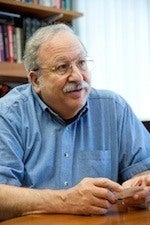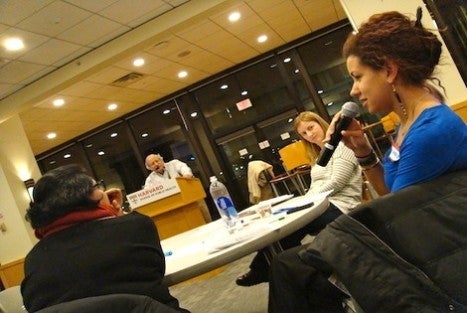December 5, 2012 — In 2004, a young senator from Illinois named Barack Obama gave the nomination speech for John Kerry at the Democratic National Convention. It was this speech, many experts say, that put Obama on the national radar screen and helped propel him to the presidency.

According to Marshall Ganz, an expert in organizing who spoke in Harvard School of Public Health’s Kresge Cafeteria on November 28, 2012, Obama’s speech contained three essential narrative elements that all would-be leaders can learn from. Obama began by telling his personal story; connected his story with those of other Americans; then spoke of the American people’s shared challenges to move them to action.
“If you’re going to engage people in change, there’s a whole language of narrative that goes with it,” said Ganz.
Ganz, senior lecturer in public policy at the Hauser Center for Nonprofit Organizations at Harvard Kennedy School, spoke to about 70 students as part of the Center for Public Health Leadership’s (CPHL) Advanced Leadership Seminar, which brings seasoned leaders to the School to share their expertise with public health students and is part of programming supporting CPHL’s Interdisciplinary Public Health Leadership concentration. Ganz has an extensive background in grassroots organizing. He was a civil rights organizer in Mississippi in 1964, spent 16 years working with Cesar Chavez and the United Farm Workers in California, and later worked with various groups on organizing and voter mobilization for political campaigns. While he continues to be an activist for social justice, he has spent more than 20 years studying the use of personal narrative in what he calls the “practice of leadership”—that is, using leadership skills not just in formal positions of power but in other situations as well.
As an example of effective narrative aimed at motivating change, Ganz first showed students the video of Obama’s 2004 speech. A second video featured a student in Ganz’ public narrative class who gave a short, powerful speech that included the same elements Obama had used—a story of self, a story of “us,” and a story of “now”—to motivate listeners to get involved with the It Gets Better Project, which supports LGBT youth and others who face harassment or bullying.
Noting that the best way to learn to be an effective leader is to practice, Ganz had the students work in small groups and share two-minute stories—with emotional impact—about their reasons for pursuing public health.
“The challenge for anybody who’s going to provide leadership for change is to break through people’s inertia to get them to pay attention,” Ganz explained. Stories help do that.
In a discussion afterwards, students said the exercise had been compelling. “When we probed, we got these amazing stories,” said one student. Said another, “The details really do matter.”
photo: Martha Stewart
